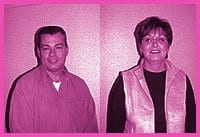Canadian police services are finally realizing that they need gay and lesbian officers on the force.
Across the country, the RCMP, provincial and municipal police services are now recruiting gay and lesbians as potential officers – believing that it will make it easier to establish better communication and greater trust between the police and the gay and lesbian communities.
“There’s a recognition that policing has to adapt to the changes that are occurring in the community and I think we are teaching the right stuff at the right time,” says Karen MacKenzie, an instructor at the Ontario Police College, who trains new recruits in diversity issues, including GLBT matters. MacKenzie feels that today’s police officer has to be more in touch with the communities they serve.
David Snoddy, who is an openly gay instructor at the college, says it’s important that police officers are sensitive to different makeups in society.
“What communities want is to see their police service reflect that diversity both in terms of who they hire, but also in terms of awareness and sensitivity,” says Snoddy.
“Recruits need to be reminded as they come into their profession what it means to provide service to the public and that the image of acting as agents of the state no longer applies,” he says.
One of the hurdles the instructors face, though, is what happens to the recruit after leaving the college and whether diversity training doesn’t become lost once on the job. “What happens to them after they leave, we don’t have a lot of influence after that,” says MacKenzie.
Snoddy points to the Ottawa Police Service as taking a lead role in making the department more reflective of the community by actively recruiting from minority groups, an approach that has been widely supported and closely watched by other departments in the province.
“Ottawa has taken the lead in Canada, and together in this very unique, and successful police-community partnership, we’re creating the path for others to follow,” says Cynthia Cousens, co-chair of Ottawa’s Police Liaison Committee for the GLBT communities.
“The Ottawa Police Service has received many inquiries from other services desirous of beginning similar community-based successes. Old attitudes, old hatreds, old discriminatory feelings have no place in policing any longer. Such perceptions are potentially damaging, and the best of future recruits will go elsewhere to seek their careers.”
Snoddy says there is a huge responsibility on the individual services when the recruits come back to be able to sustain that training and although that may be easier in larger communities like Toronto or Ottawa, it’s more difficult in smaller communities where tolerance is lacking.
“Attitudes are developed early and good coaches are needed from within the individual services because we can’t focus on training the fact that each community differs,” says Snoddy.
Cousens says that is being addressed in Ottawa by giving the liaison committee unprecedented access to graduating classes of recruits. Because of this, Cousens believes that the Ottawa Police Service will shine in the decade to come. “I truly believe the total community will reap the benefits of a deeply committed service, and we’ll all enjoy a much safer community to live in.”
Snoddy points out, however, that it’s not enough just to train recruits. He says he’s heartened by the substantial increase in policing services asking for additional training for their senior officers to deal with diversity issues. He says this is a positive step because despite all the diversity and sensitivity training available, it is still not safe for some gay police officers to come out, and this attitude can have a direct effect on how policing services are delivered to the community.
“If we don’t challenge how people treat each other on the job, then they might consider it acceptable in terms to how they treat members of the public, and that’s not acceptable,” says Snoddy.

 Why you can trust Xtra
Why you can trust Xtra


